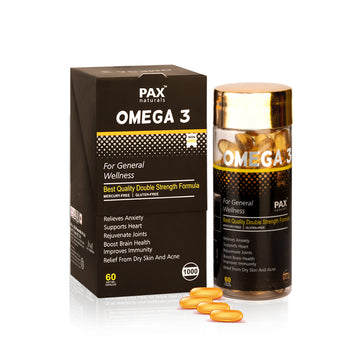Dietary Supplement And Additive to Normal Diet
Pax Naturals is an online store selling supplements for health. The goal of Pax Naturals' product launch is to offer high-quality health-related items. These solutions' natural extract-based chemicals heal your problems without causing any negative side effects.
Dietary Supplement - What is it?
You may use dietary supplements and nutraceuticals to increase the nutrients in your diet or to reduce your chance of developing conditions like osteoporosis or arthritis. Dietary supplements are available as tablets, capsules, powders, gel caps, liquids, extracts, and pills.

They might contain enzymes, fibre, vitamins, minerals, herbs, other plants, or amino acids. Certain foods and drinks may occasionally include dietary supplement ingredients. Purchasing dietary supplements and nutraceuticals does not require a prescription from a physician.
Considerations Whilst Consuming a Dietary Supplement
The best approach to receive the nutrients you require is to eat a variety of healthful foods. However, some individuals could not consume enough vitamins and minerals in a given day. When that occurs, their doctors can advise a nutritional supplement to make up for the nutrients they are missing.
About dietary supplement, whilst considering using it:
- Learn: Do as much research as you can, about dietary supplement you are considering using. Speak to your physician, pharmacist, or a licensed dietician. It's possible that a supplement won't work for you even though it helped your neighbor. Be aware of the information's source when reading fact sheets or browsing websites.
- Remember: Something is not necessarily safe or healthy for you just because it is described as "natural." It might have negative effects. It could either weaken or strengthen a medication that your doctor prescribed for you. If you have specific medical issues, it can potentially hurt you.
- Check with Your Doctor: Consult your doctor before beginning to take a dietary supplement to treat any medical issue. Without first seeing your doctor, never try to diagnose or treat any medical condition with a supplement. Learn how dietary supplements and drugs may interact.
- Wisely Purchase: A doctor's, dietitian’s, or pharmacist's recommended brands should be used. Buy no dietary supplements that include substances you don't require. Contrary to popular belief, taking too many supplements or those with a very high concentration of a nutrient can be detrimental. Spending money on unnecessary supplements is feasible.
- Check the Science: Make sure any assertion made regarding a dietary supplement is supported by research. The identification, excellence, potency, and purity of supplements are all verified by USP. There is information accessible about some dietary supplements, but it's crucial to remember that the majority of those listed have scant proof of any health benefits.
- Be a Confident Consumer: Some dietary food supplement advertisements in periodicals, online, or on TV make the claim that certain items may improve your health, stave off illness, or even lengthen your life. It's crucial to understand that frequently, there is little to no science to back up these assertions.
Why Use Dietary Supplements?
If a certain nutrient is lacking in your diet, you might need to take a supplement. Most of the time, a supplement is only needed momentarily. For instance, if you are pregnant, you may need to take supplements up to the birth of your child or the end of your breastfeeding period. In some other circumstances, such as if you have a persistent medical problem; you might need to take a dietary food supplement for a longer time.
Dietary Supplements – Who are in Need of it?
According to studies, a lot of people who take benefits of dietary supplements already obtain adequate nutrients from their diet. In actuality, the majority of supplement users are not in need of them. However, some individuals find it challenging to obtain the nutrients they require only through diet.
You may require benefits of dietary supplements if:
- Either you are expecting or nursing.
- You are aged and your diet isn't providing you with enough nutrition (malnutrition)
- Your body is unable to absorb the nutrients it requires due to a health problem you have (for example, if you have chronic kidney disease and are on dialysis)
- You have a significant requirement for a certain nutrient (for example, if you are at risk of osteoporosis and need more calcium)
- You have a restricted diet (for instance, you could not be getting enough iron if you don't eat meat).
- You are lacking in certain nutrients (for example, a blood test shows you have a vitamin D deficiency)
Risks Involved in Dietary Supplements Consumption
Each nutrient has a specific amount that the body needs, although more is not always better. In fact, getting more than you require occasionally has negative effects. For instance, taking excessive amounts of vitamin B6 might disrupt the nervous system, and taking vitamin A, C, or E supplements while pregnant can be extremely harmful to the unborn child.
Additionally, some supplements and the medications you are taking may interfere. Consult your pharmacist or doctor to ensure that any supplements you intend to take are safe.





































